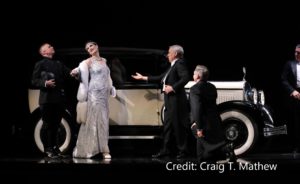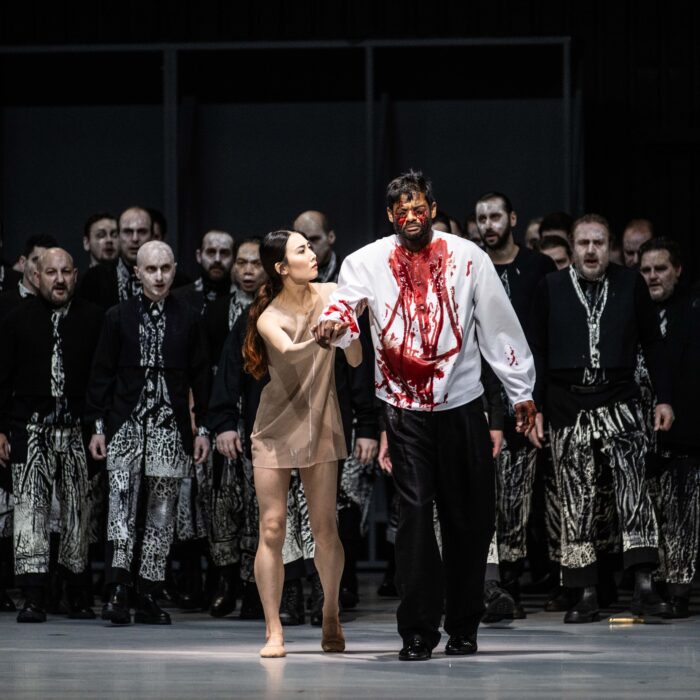
The Los Angeles Opera’s 2018-19 season closes this June with a return of Marta Domingo’s “Roaring ‘20s” production of Verdi’s “La Traviata.”
On opening night, I found this an effective, straight, yet moving rendition of Verdi and Piave’s account of Violetta the courtesan, close to death, who is denied her one late-in-a-short-life chance of true love.
Roaring 20s
Of course, Violetta, the courtesan, is skilled in concealing the nature of her terminal illness which we, the audience, are meant to know is caused by her lifestyle. And choosing the Roaring 20s as the setting is clever. As an era, what does the Roaring 20s say immediately? Partying, partying, continually partying, oblivious of the social disaster about to strike. The opening scene, complete with cream Rolls-Royce, and Act two scene two – with some show-stopping dancing by Louis A. Williams Jr – effectively provided entertaining relief, if not escape, from the tragic downward trajectory of Violetta’s tale.
Changing the chronology of a work can expose a director to criticism but I actually believed that Act two’s party-goers could Charleston to Verdi’s party music. And Domingo’s design made no bones about librettist Piave’s stark plotting of the seasons either. Summer turned to Fall very effectively in Act two (complete with falling leaves), and snow fell on Violetta on her deathbed in Act three. Seeing her there asleep with her maid Annina at her feet had an almost Sleeping Beauty poignancy.
Verdi and Piave based their opera on Alexandre Dumas The Younger’s accounts of his own affair with Marie Duplessis, the famous Parisian demi-monde of the 1840s who lived and died (of consumption) amid a life of luxury provided by wealthy admirers. Such a grim backstory was smartly conveyed by a lamplight pantomime to the opening prelude which basically said that if a young woman wishes to survive in this city she might succumb to the sexual predation of wealthy men.
Conlon Creates Wonderful Verdi
Under the direction of LA Opera’s Music Director James Conlon, “Traviata’s” cast and orchestra served the brisk telling of this drama, while creating satisfying musical shape and highlights. I enjoyed hearing rhythmic articulations I don’t recall hearing so clearly before in the great scene where Germont the Father comes to persuade Violetta to give up his son for the sake of their family’s reputation and his daughter’s pending marriage and is moved by Violetta’s unexpected dignity. There was a dramatic integrity to Conlon’s direction, even to the point of risking the beauty (something Verdi the dramatist might have countenanced) in the big outburst that underlines Alfredo’s discovery of Violetta’s return to Paris. The briskness of the Act two finale surprised me perhaps. After the “rejected” Alfredo has disgraced himself with his petulant, insulting behavior toward Violetta, I thought the tempo, and the embarrassment of the moment, might have been more drawn out. But the seriousness of the public humiliation might have come across perfectly clearly to the majority of audience-members listening to this grand choral number.
Convincing Portrayals
The principals, Adela Zaharia as Violetta, Rame Lahaj as Alfredo and Vitaliy Bilyy as Germont (all past winners of Plácido Domingo’s Operalia competition), generated convincing portrayals of some of the most finely-drawn characters in 19th-century musical-dramatic literature.
As Alfredo, Rame Lahaj sang with almost the detail of speech – the reflective way he delivered Act one’s rebuke to the dismissive Violetta “You laugh. Have you no heart? (to cite David Anglin’s surtitles),” for example, or launched into the reminiscence “Un dì, felice” in such a way as to convey dramatic continuity rather than blatantly signal “musical highlight.” All three principals maneuvered Verdi’s rhythms with admirable clarity but I noted real definition particularly in Lahaj’s “O mio rimorso,” the self-reproaching cabaletta to his Act two aria, “De’ miei bollenti spiriti”.
Naturally Violetta, the “Traviata” or changed woman, is the center of our attention in any production of this work, but the standout scene is often that between Violetta and Alfredo’s father, Germont in Act two. Verdi’s plotting of Germont’s attempt to persuade Violetta to abandon her socially-unacceptable (to him) life with Alfredo is one of the great two-handers in any form of drama – I’m often amazed that Felice Varesi, the first Germont in 1853, failed to appreciate the gem of a role he’d been given – and in Bilyy’s and Zaharia’s account we were able to trace Germont’s effect on Violetta through all the stages leading up to her concession for the good of Alfredo’s family and the Germont daughter’s pending marriage. Zaharia’s rendition of “Dite alla giovine” was particularly moving in this context.
Violetta sings cadenzas as readily as she displays her external signs of wealth. Zaharia’s cadenzas were reliable and thrilling but also dramatically telling, as when she initially dismissed Alfredo’s ardor or contemplated the word “Gioire” just before deciding, in Act one, “Sempre libera.”
As I’ve found in so many LA Opera productions, the standard of straight acting was high – this was noticeable in Zaharia’s slapping of the table-top when forcing herself to go along with Germont’s unreasonable proposal to abandon her one shot at happiness, or Alfredo’s studied rubbing of his nose when trying to pretend he isn’t affected by Violetta’s presence at Flora’s Act two party. This level of acting detail was present even in the performance of the associate roles as when Annina (Erica Petrocelli) and Giuseppe (James Callon) made themselves scarce on Germont’s intrusion at Violetta and Alfredo’s country house retreat. Among other supporting artists, Wayne Tigges made a convincingly stiff-necked, humorless baron.
I was told beforehand that this “Traviata” is currently the best ticket in town. I’m glad I got to see it.


